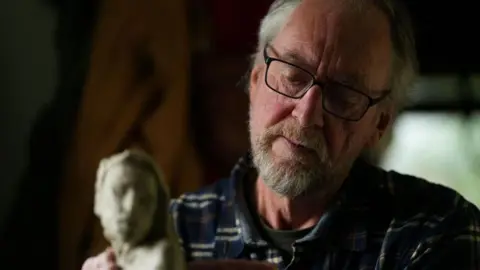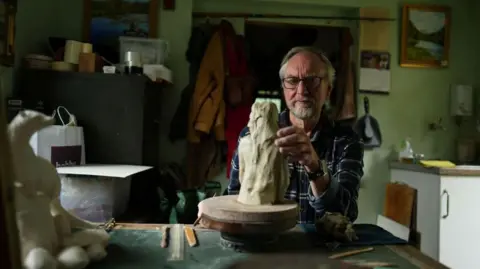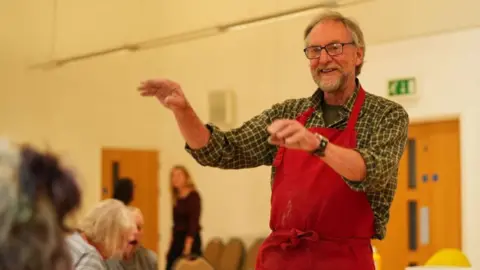Man uses sculpting as therapy for Parkinson’s
 BBC
BBCA man says art sculpting has become his “therapy” after being diagnosed with Parkinson's disease four years ago.
Neil Dalrymple, a ceramic artist from Ruthin, Denbighshire, said his symptoms ease when he sculpts as he feels “calm” and “a sense of peace”.
Since his diagnosis, he has noticed that his drawings and paintings are not as neat as they used to be.
But Neil said it has not affected his sculpting as using the clay is “calming”.
“I can close the door to keep the noise out and concentrate on what needs to be done, and that seems to calm me down," he said.
As the son of an art teacher, Neil’s love for sculpting began when he was in primary school.
Often bored and struggling with his hearing he would find pieces of plasticine and make little animals out of them.
His father would also bring home clay for him practise with.
He went on to study art and teaching, and established himself as an artist in British Columbia, Canada, after moving there in the early 1970s.
After 13 years of selling his work in a variety of different galleries he moved back to Wales and set up a workshop in Ruthin craft centre.
He worked there until he was diagnosed with Parkinson’s in 2020, deciding to move his workshop to his garage at home.
Neil said he had started noticing a shake in his leg and went to see a specialist in Glan Clwyd Hospital.
“When you've got Parkinson's you tend to ignore it at first, but as it goes on it sort of becomes more and more irritating," he said.
“My reaction was not to worry about it, just to get on with it and work with it - you kind of go into denial.”
 Neil Dalrymple
Neil DalrympleNeil said his diagnosis forced him to give up teaching art in schools as he was struggling with fatigue, along with other symptoms.
He said: “In situations like going out for dinner you can't relax, you're always aware of your shakes.”
Neil takes six dissolving tablets a day which helps ease the tremor in his arms and legs.
And, to help other people affected by the disease, Neil is overseeing 12 weekly art classes with the help of Parkinson's UK Cymru.
Wendy Allison from the charity said the classes are important as anything involving using fine motor skills are good for helping people manage their symptoms.
 Neil Dalrymple
Neil DalrympleThe project will create a large mural to be displayed at an NHS clinic in north Wales.
Neil said: “I'm hoping people can lose themselves in art and get involved with an activity they might not have done before.”
The aim is to show them that “life doesn’t stop when you have a Parkinson’s diagnosis”.
“Don't sit still and accept it. Just get out there and do it,” he said.
Ms Allison said: "Parkinson’s can be a really isolating thing to live with, so anything that involves people coming together - where they can talk, share their struggles and have fun - is very important.
"Things that involve fine motor skills, cognitive thinking and hand/eye coordination is really good as well."
